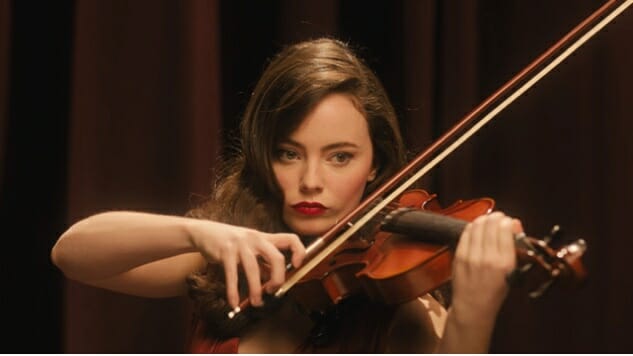The Sonata Hits One Great Note and Misplays the Rest

Fifty minutes into Andrew Desmond’s The Sonata, the plot thickens: After racking their brains over a seemingly incomprehensible piece of music, the symphony of the movie’s title, Rose (Freya Tingley) and Charles (Simon Abkarian) discover a cryptic series of heat-activated symbols hidden amongst its melodies, chords and rhythms. Suddenly, the piece isn’t so incomprehensible anymore. Rose and Charles are on the case, ready to decipher the symbols’ meaning and find the message Rose’s father, the late composer Richard Marlowe (Rutger Hauer), hid in his final masterwork. What fun!
The horror genre knows how to have a blast, but pulpy, detective mystery horror movies are in short supply: Go back to 2014’s As Above, So Below for a recent example. Seeing that sleuthing spirit on screen in 2020 is a delight. But the operative phrase here is “fifty minutes into.” Desmond brings Rose and Charles around to their revelation with only around 30 minutes remaining on the clock, which leaves little room for his late-stage Da Vinci Code angle to fully breathe. Oh, the mystery is solved, no doubt about that, but the pleasure of a good mystery isn’t the solution but the solving itself, and The Sonata doesn’t have time to luxuriate in the latter. It’s too focused on finishing the puzzle than putting the pieces together, which is a shame.
The Sonata, as a whole, is a cluster of muddled character motivations strung together with overbearing exposition: Rose’s backstory is doled out in pieces and bits by Charles, her agent, a man who’s equally as interested in shielding her from the truth about her wacko genius father as he is in propelling her to stardom. She’s a violin virtuoso but knows next to nothing about Richard. She knows so little of him, in fact, that she believes he’s actually been dead for years, when in fact he’s just been in France, toiling away in the isolation of his great, big, creepy mansion, carving out his asymmetrical parting salvo to the world, and to his own daughter, note by note.
-

-

-

-

-

-

-

-

-

-

-

-

-

-

-

-

-

-

-

-

-

-

-

-

-

-

-

-

-

-

-

-

-

-

-

-

-

-

-

-








































